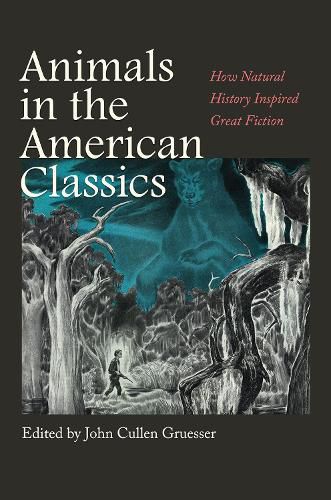Readings Newsletter
Become a Readings Member to make your shopping experience even easier.
Sign in or sign up for free!
You’re not far away from qualifying for FREE standard shipping within Australia
You’ve qualified for FREE standard shipping within Australia
The cart is loading…






As defined by conservation biologist Thomas Fleishner, natural history is a practice of intentional, focused receptivity to the more-than-human world … one of the oldest continuous human traditions. Seldom is this idea so clearly reflected as in classic works of American fiction of the nineteenth and twentieth centuries.John Cullen Gruesser’s edited volume Animals in the American Classics: How Natural History Inspired Great Fiction features essays by prominent literary scholars that showcase natural history and the multifaceted role of animals in well-known works of fiction, from Washington Irving in the early nineteenth century to Cormac McCarthy in the late twentieth century, and including short stories and novels by Edgar Allan Poe, Herman Melville, Mark Twain, Zora Neale Hurston, William Faulkner, Ernest Hemingway, Jack London, John Steinbeck, and Harper Lee.
As an introduction to or a new way of thinking about some of the best-known and most beloved literary texts this nation has produced, Animals in the American Classics considers fundamental questions of ethics and animal intelligence as well as similarities among racism, ageism, misogyny, and speciesism.
With their awareness of Poe’s more-than-casual knowledge of natural science, Mark Twain’s proto-animal rights sensibilities, and Hurston’s training as an anthropologist, the contributors show that by drawing attention to and thinking like an animal, fiction tests the limits of humanity.
$9.00 standard shipping within Australia
FREE standard shipping within Australia for orders over $100.00
Express & International shipping calculated at checkout
As defined by conservation biologist Thomas Fleishner, natural history is a practice of intentional, focused receptivity to the more-than-human world … one of the oldest continuous human traditions. Seldom is this idea so clearly reflected as in classic works of American fiction of the nineteenth and twentieth centuries.John Cullen Gruesser’s edited volume Animals in the American Classics: How Natural History Inspired Great Fiction features essays by prominent literary scholars that showcase natural history and the multifaceted role of animals in well-known works of fiction, from Washington Irving in the early nineteenth century to Cormac McCarthy in the late twentieth century, and including short stories and novels by Edgar Allan Poe, Herman Melville, Mark Twain, Zora Neale Hurston, William Faulkner, Ernest Hemingway, Jack London, John Steinbeck, and Harper Lee.
As an introduction to or a new way of thinking about some of the best-known and most beloved literary texts this nation has produced, Animals in the American Classics considers fundamental questions of ethics and animal intelligence as well as similarities among racism, ageism, misogyny, and speciesism.
With their awareness of Poe’s more-than-casual knowledge of natural science, Mark Twain’s proto-animal rights sensibilities, and Hurston’s training as an anthropologist, the contributors show that by drawing attention to and thinking like an animal, fiction tests the limits of humanity.